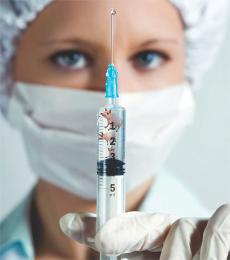Swine flu vaccines to come in October

H1N1, seasonal flu vaccines available on campus
September 13, 2009
With more cases of H1N1, also known as swine flu, expected this fall, Sacramento State will offer free swine flu vaccines to students, faculty and staff members, along with seasonal flu vaccines given every year.
Specific immunization schedules for the H1N1 vaccines are not yet determined, but the vaccines have already been pre-ordered and are expected to arrive in late October, said student health services director Joy Stewart-James.
Yearly vaccinations for the seasonal flu are scheduled during Phlagleblast from 9 a.m. to 2 p.m. today in the University Union and during the Natural High Health Fair from 10 a.m. to 2 p.m. on Oct. 21 in the Library Quad. Seasonal flu shots, which have to be purchased by the Student Health Center, are offered for free to students and are $15 to faculty and staff members.
The swine flu’s higher-risk groups, as determined by the Centers for Disease Control and Prevention, are pregnant women, caregivers of children age 6 months and younger, health care workers, persons between ages 6 months and 24 years and adults between ages 25 and 65 years with high-risk medical conditions, such as chronic health disorders and compromised immune systems.
Lourdes Davila, an undeclared freshman, said she’ll probably take the swine flu vaccine as a precaution. “We can’t afford to get sick,” Davilla said.
Stewart-James said two doses will likely be required, with the second dose given three weeks after the initial dose.
In response to the onset of swine flu this summer, Sac State has taken the necessary steps to inform and prepare the campus community in case of an outbreak, said Kirtland Stout, risk management and business continuity interim director for Sac State.
Faculty and staff that fall in the higher risk group will be vaccinated at no charge, Stewart-James said.
Vaccinations for both swine flu and seasonal flu are voluntary. However, people who fall under the swine flu high-risk categories are encouraged to get the vaccine, Stewart-James said.
Unlike H5N1, or avian flu, that has a mortality rate of 60 percent, swine flu is a fairly mild flu with a mortality rate of less than tenth of a percent, Stout said.
“I really don’t think it’s (swine flu) going to be as horrible as they portray in the news,” said Anna Brown-Dawson, junior criminal justice major. “I think vaccination is necessary to people who live in dorms because they live in close proximity with other students, but to others who commute it’s a personal choice.”
The health center’s worst case so far has already recovered, Stewart-James said.
“The university has been on top of this as we could possibly be,” Stout said.
Stout said Sac State’s plan for this flu season has guidelines to keep people with flu-like symptoms from spreading it to others.
“One of the things that we’re really trying to stress is prevention,” Stewart-James said.
Students, faculty and staff members who experience flu-like symptoms are encouraged to stay at home or to self-isolate until they are fever-free for at least 24 hours, Stout said.
Students should call the health center if they are experiencing flu-like symptoms. The health center has set up a phone triage system that will enable a student to talk directly to a medical provider, who will then evaluate the severity of the case and determine if the student needs to be seen at the clinic, Stewart-James said.
In most cases, students recover well on their own just by getting plenty of rest and keeping themselves hydrated, Stewart-James said.
Students living in apartments and dorms are also encouraged to have “flu buddies” who will help and monitor them. That way, people experiencing the symptoms will not be spreading them to others and will not get very ill because no one is watching after them, Stout said.
Stewart-James said they have done presentations at residence halls this summer to make students and staff more aware of preventive measures.
In campus divisions, staff members are asked to have a “succession list” that will determine who will take over a job if a staff member gets sick, Stout said.
Faculty members are asked to advise students who become infected to stay at home and to modify classroom guidelines as needed.
More information about the swine flu is available at http://www.csus.edu/hlth/.
Kristine Guerra can be reached at [email protected].











































































































































